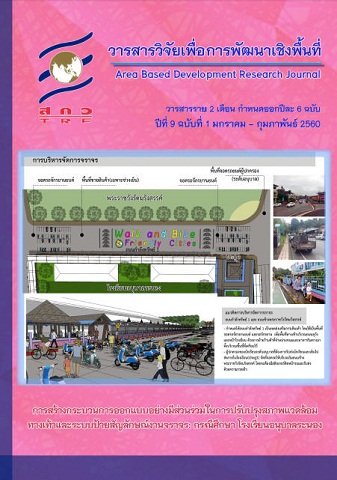การพัฒนากระบวนการผลิตข้าวโป่งให้ได้คุณภาพมาตรฐานของการผลิตอาหารสู่เชิงพาณิชย์ที่ยั่งยืนโดยการมีส่วนร่วมของชุมชน
Main Article Content
Abstract
ข้าวโป่ง เป็นผลิตภัณฑ์ที่ได้จากการนําข้าวเหนียวมาแปรรูปเป็นอาหารว่างรับประทานในครัวเรือน ซึ่งมีประชาชนในหลายพื้นที่ของจังหวัดนครราชสีมาผลิตข้าวโป่งจําหน่ายเป็นอาชีพเสริม แต่กระบวนการผลิตของชุมชนยังไม่ได้คุณภาพมาตรฐานของการผลิตอาหาร ที่สามารถยกระดับข้าวโป่งสู่เชิงพาณิชย์และสร้างมูลค่าเพิ่มของสินค้าได้การวิจัยในครั้งนี้มีวัตถุประสงค์เพื่อ 1) ศึกษาและพัฒนากระบวนการผลิตข้าวโป่งให้มีคุณภาพและมาตรฐาน ถูกสุขลักษณะที่ดีในการผลิตอาหาร และ 2) พัฒนาเครื่องมือการผลิตข้าวโป่งและบรรจุภัณฑ์ให้ถูกต้องตามหลักสุขอนามัย โดยประยุกต์ใช้การวิจัยเชิงปฏิบัติการแบบมีส่วนร่วม ที่บ้านห้วยยาง หมู่ที่ 7 ตําบลหินดาด อําเภอห้วยแถลง จังหวัดนครราชสีมา ระหว่างเดือนมิถุนายน พ.ศ. 2558 ถึงเดือน พฤษภาคม พ.ศ. 2559 เริ่มจากการสํารวจและคัดเลือกพื้นที่เป้าหมาย ศึกษากระบวนการผลิตข้าวโป่งสูตรดั้งเดิม ตรวจสอบกระบวนการผลิตและบรรจุภัณฑ์ และถ่ายทอดเทคโนโลยีให้ชุมชนในพื้นที่ ผลการดําเนินงานพบว่า กลุ่มผู้ผลิตข้าวโป่งบ้านห้วยยางหมู่ที่ 7 ตําบลหินดาด อําเภอห้วยแถลง จังหวัดนครราชสีมา สามารถนําเอาความรู้ที่ได้จากการวิจัย พัฒนากระบวนการผลิตข้าวโป่งได้คุณภาพและมาตรฐานที่ถูกสุขลักษณะ โดยการใช้เครื่องมือและบรรจุภัณฑ์ ส่งผลให้กลุ่มผู้ผลิตข้าวโป่งมีรายได้เพิ่มขึ้น ได้รับความรู้ด้านวิชาการเทคโนโลยี มีอาคารและเครื่องมือ ซึ่งทําให้การผลิตข้าวโป่งมีมาตรฐานที่ดี เป็นผลิตภัณฑ์ดีเด่น มีเอกลักษณ์และชื่อเสียงที่สามารถยกระดับคุณภาพผลิตภัณฑ์สู่เชิงพาณิชย์ได้ อีกทั้งกลุ่มผู้ผลิตมีรายได้เพิ่มขึ้น จากบันทึกบัญชีรายรับ-รายจ่ายของกลุ่ม ในระยะเวลา 1 ปี จากเดิมยอดจําหน่ายอยู่ที่หนึ่งแสนบาทต่อปีหลังการพัฒนาเพิ่มเป็นหนึ่งแสนเจ็ดหมื่นบาทต่อปี
Sustainable Development of Crispy Rice Production for Commercial Food Production Standards by Community Participation
Crispy rice is a product from glutinous rice food processing as a snack for all the household. There are a large number of locals in Nakhon Ratchasima producing crispy rice as a part-time occupation. However, the production processes in the community do not meet the standard in the food production for a value-added commercial product. This research is aimed to 1) study and develop crispy rice production for good quality and high standards of food production based on sanitation standard, and 2) develop crispy rice production equipment and packaging based on a sanitation standard with participatory action research at Huay-yang Village, Huaytalaeng District, Nakhon Ratchasima from June 2015 to May 2016. The research started with survey and selection of target area, study the traditional crispy rice production, monitor the beginning and final production process and packaging, and transfer the technology for the community. The findings showed that crispy rice group producer from Huay-yang Village, Huaytalaeng District, Nakhon Ratchasima was able to use the knowledge from the research to develop high quality and standard crispy rice production process through equipment and packaging. The local producer gained the higher income and received the academic knowledge and technology, building and equipment which resulted in high quality rice crispy production process with unique characteristics. This product was well known and able to be upgraded as a commercial product. The local producer gained the higher income from recording income statement in 1 year period from 100,000 to 170,000 Baht of the sales volumes after the development.
Article Details
Area Based Development Research Journal values copyright protection and licensing to safeguard author rights and facilitate the appropriate dissemination of research. Our policies ensure openness, accessibility, and attribution. Authors retain copyright ownership, and articles are published under a Creative Commons Attribution License (CC BY), allowing sharing, adaptation, and proper attribution. Authors have the freedom to publish under the CC BY license, granting broad reuse and distribution permissions. The journal supports posting articles on third-party repositories, adhering to institutional and funding restrictions. Author guidelines detail copyright and licensing requirements, empowering authors with knowledge about their rights and responsibilities. These policies cultivate an environment of collaboration, openness, and responsible sharing, benefiting authors and the research community while honoring intellectual property rights.


